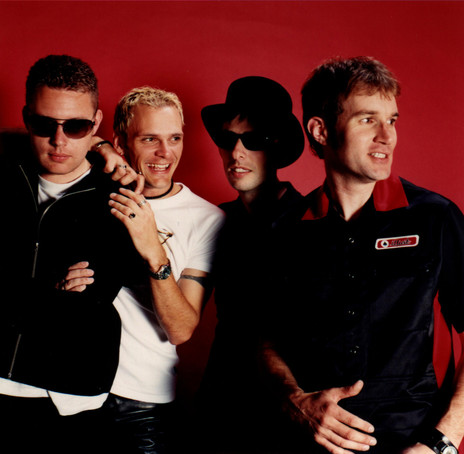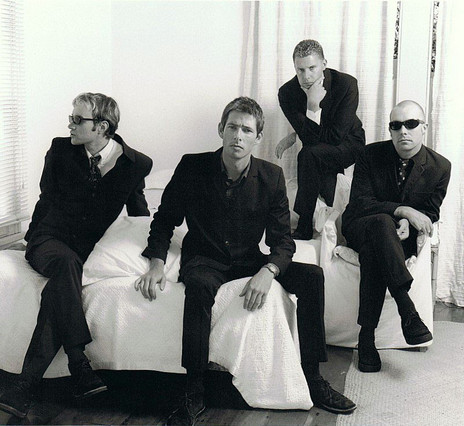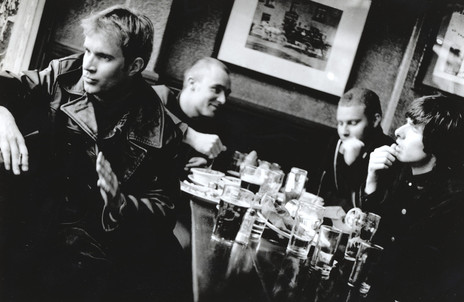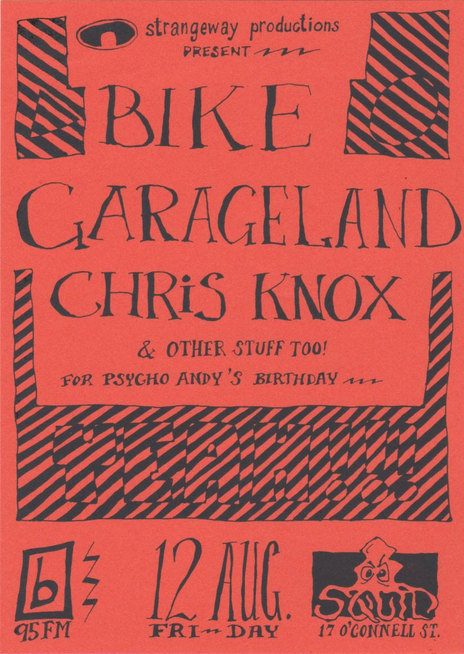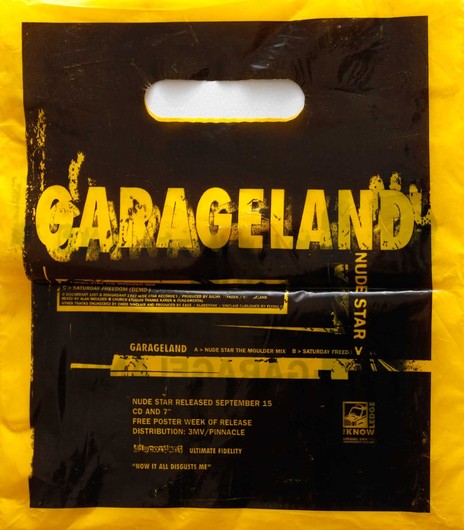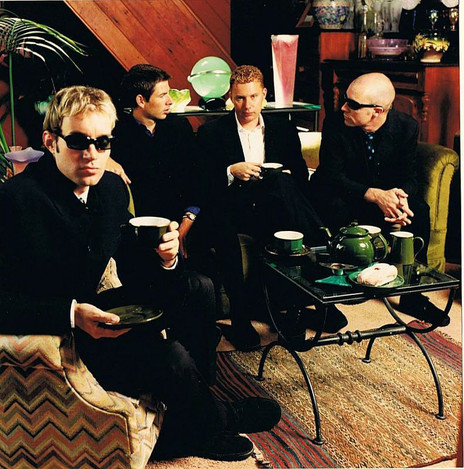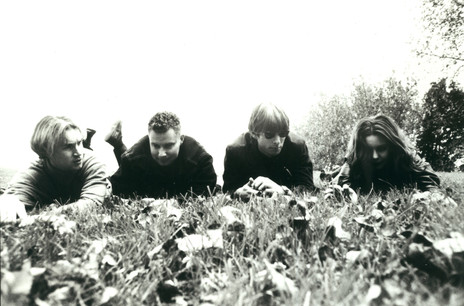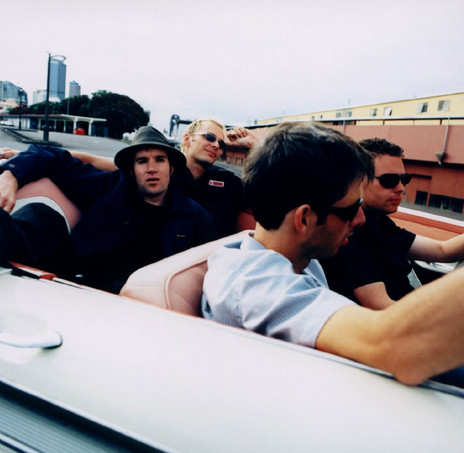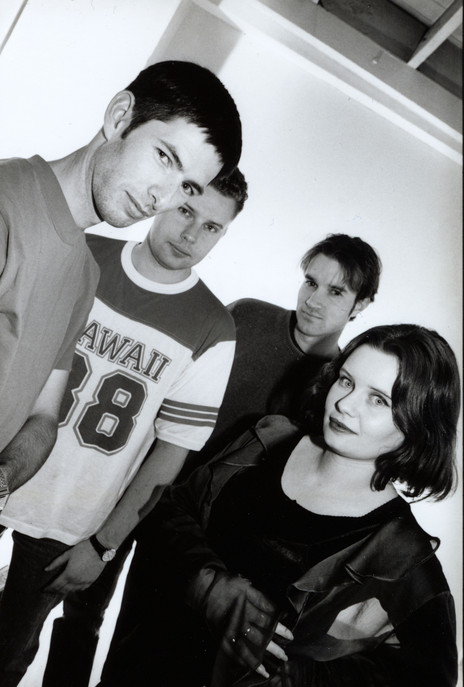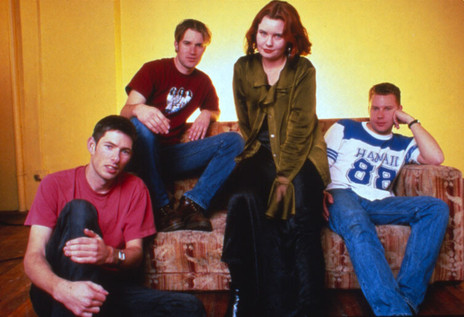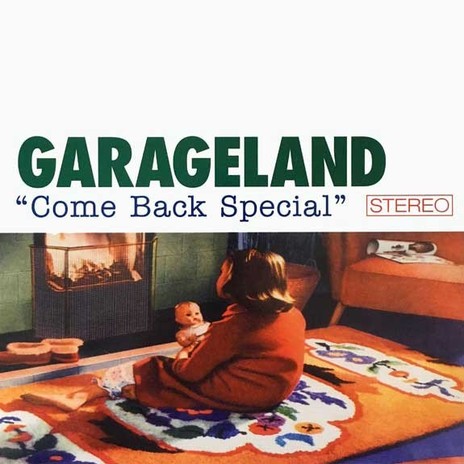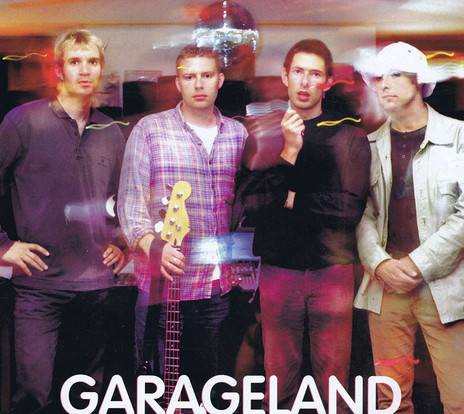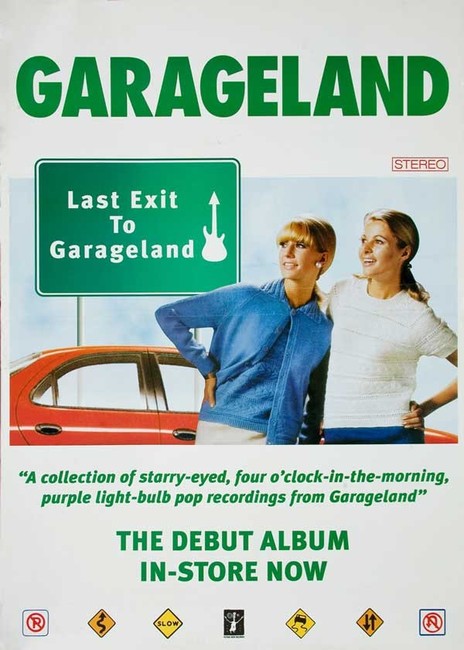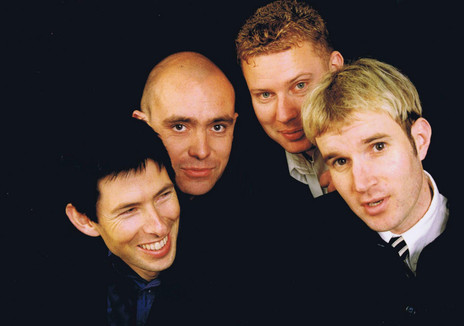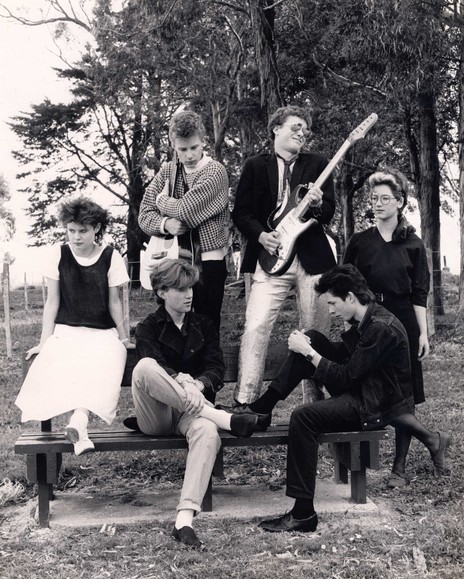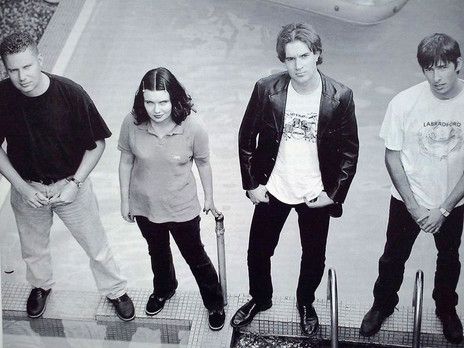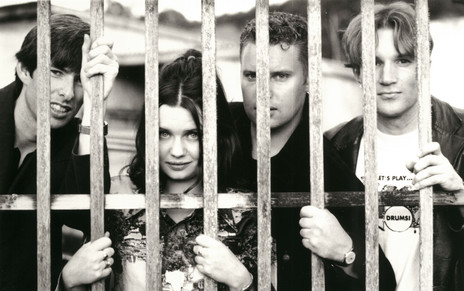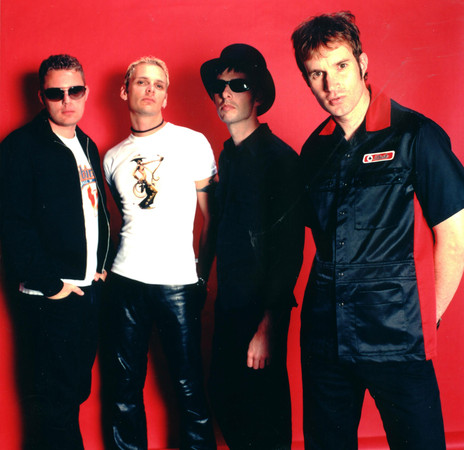The “Flying Nun Sound” has long been debated – and rightly so. The label has long boasted a range of musical styles broad enough to render the term almost useless, but signing bands with great songs has been the label’s common thread. And if hook-laden indie-pop songs with a dose of vinegar behind the sweetness are your bag, then Garageland had them in spades.
It all started with school band The Incrowd, comprising Mark Silvey, Andrew Gladstone and Jeremy Eade; Debbie Silvey provided harmonies, having sung in madrigal choirs in the UK. Her brother Mark had played guitar since the age of eight, granting him the honour of being Garageland’s most musically experienced member. The Incrowd had some local impact. They played with Marginal Era on the roof of the Pakuranga Town Centre and at Russell Crowe’s The Venue in Symonds Street. Andrew and Jeremy were also in college band The Sexual Deviants, who were well received during their short life, although the details remain as murky as the band’s name.
Jeremy had a guitar, Andrew bought a drum kit from the change he’d stored in his sock drawer, and they had a band name, taken from the Clash song ‘Garageland’.
Fast forward a few years to 1992, and Jeremy and Andrew were flatting together. Jeremy had a guitar, Andrew bought a drum kit from the change he’d stored in his sock drawer, and they had a band name, taken from the Clash song ‘Garageland’. With Andrew working at Truetone Records, burgeoning alternative imports provided inspiration.
Garageland’s first gig was at Stuart Broughton’s legendary Newton Road venue the Dog Club in 1992, headlined by Steam, with a young Nick Kreisler on bass, who did artwork for the band later on. Jeremy says, “We went down really well but we didn’t get a gig after that. We failed to schmooze.”
Lack of schmoozing aside, the band quickly organised a slew of gigs at notable (and long-gone) Auckland venues the Pelican Bar, Punch and Judy’s and Rocks in the Attic.
Garageland’s knack for song and melody quickly gained them attention. As Andrew says, “I think we wrote good songs, and were uncomplicated musically (none of us were expert players). And there weren’t too many songwriters around that had Jeremy’s ability with words and melody.”
Each band member agrees that the airplay they had on 95bFM – and the student radio network overall, played a huge part. In particular, 95bFM Programme Director Graeme Humphreys’ playlisting of ‘Nude Star’ really started the band’s momentum.
Garageland’s label break came when they supported The Clean and impressed the Flying Nun crew enough to be signed, with the Come Back Special EP being released in 1995 and charting in the NZ Top 20. They also contributed their version of ‘Dancing Queen’ to Flying Nun’s ABBA tribute album ABBAsolutely.
“It was a time when the independent way in Auckland was that bands were getting what were effectively self-produced tracks onto bFM,” recalls Flying Nun’s Paul McKessar, “and we were then able to join with them and make EP releases. It’s how we started with both Garageland and Bressa Creeting Cake.”
As Jeremy pragmatically points out regarding their growing fanfare, “I lost track of it after our initial bFM success. After you start filling gigs up you want to keep that going. I was worried we would burn out – bands come and go … so I didn't really enjoy the acclaim because I knew it could be very fleeting.”
“It was a slow and steady climb really,” adds Mark Silvey, “but the gigs got bigger and the crowds got larger as we started to get more radio, and the release of our first EP, Come Back Special, was the turning point.” For Debbie, “It was a bit freaky – I remember playing at Albert Park at a bFM Summer Series gig, playing ‘Fingerpops’ and a few people came up after and said, ‘Oh my god – I heard you guys on the radio and thought you were an American band!’ But the biggest thrill for me was when people would sing along with the songs at gigs word for word – amazing!”
Paul McKessar backs this up: “It was a fun time to work with them. My favourite moment was the Smashing Pumpkins support at [Mt Smart] Supertop with the whole crowd singing ‘Fingerpops’. They were also the first band we sent to England and the US in a while who really connected on a scale.”
The band's full-length debut, Last Exit to Garageland, was released in 1996 and reached No.3 on the NZ Album Chart. The album release tour took them to Australia, France, and the UK.
Moving to the UK seemed like a natural progression for Garageland – and a huge punt.
Upon their return, Garageland’s international reputation for popsmithery was a bit of a talking point; moving to the UK seemed like a natural progression for Garageland – and a huge punt. Their UK tour had gone well, and the move was solidified by the news that NME were going to make their single ‘Come Back’ single of the week – except the editor changed his mind as the band’s NZ location seemed too far away for their readership to get to grips with. Realising that being in the UK scene was crucial to making decent inroads, most of the band – aside from Debbie Silvey, who had family and radio commitments – quit their day jobs and headed over.
Without Debbie, a new guitarist was needed. They found one in the form of Andrew “Clanger” Claridge. Andrew Gladstone recalls, “In England we auditioned a couple of replacement guitarists that were pretty unsuitable until Alan Gregg from The Mutton Birds told us about a guitarist they had auditioned who was brilliant. They hadn’t hired him because Chris Sheehan [The Starlings, Dance Exponents] became available. So we asked Andrew to learn a couple of songs and come over for a jam. He showed up and played significantly more complex versions of every song on the Last Exit album. We basically could’ve gigged that night. Andrew is a great player but he needed some reigning in because we liked things simple – and that matched our ability too. He obliged and I think it made him an even better player ultimately.”
Jeremy Eade: “Going to London was a dream for me. The band had to reinvent itself without Debbie but … I looked at my guitar and thought, ‘Jesus, you are a ticket to a lot of cool places’. London was old and I loved it. The Eade clan are originally from the East End. I would look at the Tower of London, then catch the tube home from Tower Hill, a place where historically they used to hang wrongdoers in front of huge screaming crowds. I love London, the history is incredible.”
Mark Silvey: “For me it was like moving back home, kind of. My dad, half brother and sister are there, but never before had I lived there with a band. We found Andrew Claridge in time for our first big tour with the ‘next big thing’ – Symposium. From then on living in the UK was just a base really. We worked really hard when we lived in England, we grew as musicians thanks to playing with Andrew Claridge, we became a business (or non profit organisation!) as much as a band, and there was a lot of pressure to juggle writing singles that the record company wanted to hear and find time to drink down the local.”
Andrew Gladstone: “We toured most of the toilets of Britain and worked really hard. We had some successes and played some great shows, but in the end we maybe weren’t rock star material enough for Britain. We also toured America quite a bit and had some great tours and shows. My biggest regret, and something we had little to no control over, was not spending more time in France. We felt there was a strong groundswell for us there, but Mushroom wanted us in England. Which was understandable I guess.”
Debbie Silvey didn’t make the move – she had work commitments in the radio world that weren’t to be sniffed at. But when asked how she felt about staying behind, a line from ‘Fingerpops’ pretty much summed it up: “I missed them EVERY SINGLE DAY!”
Garageland were booked for some pretty cool tours once they hit the UK, touring with DEUS and Swell, plus travelling to North America twice, first with Swervedriver, and then Tanya Donnelly. 1997 also saw the UK and US releases of Last Exit To Garageland, plus several European festival appearances.
“We recorded the song ‘Feel Alright’ in London and Mushroom contacted John Cale to see if he’d be interested in mixing it.”
– Andrew Gladstone
Before and during the move to the UK, the band had experienced some highlights that few bands could match, including meeting and working with John Cale. "We recorded the song ‘Feel Alright’ in London and Mushroom contacted John Cale to see if he’d be interested in mixing it," says Andrew Gladstone. "He was, so we set up a breakfast meeting at a New York café. We turned up nervous and probably hung over – and Cale turned up in Day-Glo gym gear. We ordered the full English breakfast (or American version of IT); Cale ordered mineral water. He said he loved the song and wanted to play piano on it. We agreed that this was a good idea and that was that. The final product is still one of my favourite Garageland recordings and John Cale does indeed play piano on it. After he sent the finished version back I called him at his home to thank him on his fine work. I was like a nervous teenager ringing a girl to ask her out on a first date. He answered, and was angry that some stranger had got his number. After explaining who I was he softened up and was very complimentary about the song and how it turned out. He turned me down on the date though.
“Opening for the Smashing Pumpkins the week before we released Last Exit was also pretty special. We had barely played a handful of tiny club shows up until this point. Our gear was shitty, except Debbie, who had nice gear, and we were pretty green musicians. But the crowd were chanting our name before we went on.”
Debbie agrees: “So many highlights: playing in Paris with Tricky and Mazzy Star at the Olympia; playing with bands like Smashing Pumpkins and Weezer; stealing riders and driving all over Australia at night. Lowlights of course, getting the Maton [guitar] nicked while on tour in Sydney, the whole band getting sick with chickenpox. No lowlights really.”
Mark Silvey: “I remember flying from NZ to LA and I felt like an excited little kid. That was a highlight for me for sure, as was flying from NZ to Austin, Texas to play the SXSW festival. We went all that way just for the weekend to play one gig, then flew home again. Also Last Exit To Garageland going gold!”
Jeremy’s highlights include radio play, both local and international. “That is great oxygen for a band.” But his lowlights also involved radio (or lack of), and the international music media in general. “Being teased then denied a playlisting by Triple JJJ in Australia, RADIO ONE in the UK and KROQ in the US. All three had thoughts of playlisting us but we couldn't get that coveted spot. That's what we really needed overseas, serious airplay. We got on UK telly a few times because we were on the UK indie charts. That was pretty cool. NME courted us for a while then overnight they got nasty. I met a few major music journalists over there. They were generally rock and roll drunks who didn't make a lot of money but held a lot of sway over that scene. I saw them intimidate bands and labels, which made me quite sad as I had read a lot of the UK music papers in New Zealand and in print they came across as groovy, chilled out, carefree people. Everyone in Britain wanted the front cover, or an article or a review. Not getting mentioned in the UK press was a sure road to obscurity.”
The group returned to New Zealand for a tour in early 1998, then went to the US yet again, this time on tour with Spacehog and as part of the South by Southwest (SXSW) festival line-up. After that, Garageland gigged less and partied more for several months, not getting around to thinking about their second album until later that year.
January 1999 took the band on a brief Australasian tour as part of the Big Day Out Festival, immediately followed by the recording of their second album, Do What You Want at Neil Finn’s Auckland studio. By this time, Garageland had relocated to New Zealand. Do What You Want (Flying Nun, 1999) was also released in the USA, on the Foodchain label. By 2001, Claridge was replaced with guitarist Dave Goodison.
“The dream I was sold after reading rock ‘n’ roll biographies of The Rolling Stones and The Beatles was just nowhere to be seen.”
– Jeremy Eade
The band released their third and final album, Scorpio Righting (produced and engineered by Malcolm Welsford), in 2001 before calling it a day. However they did re-form for a one-off gig at the Kings Arms, Auckland, in November 2007.
The split, when it came, was entirely amicable – not driven by excess-fuelled egotism, but by a bunch of smart people who “were realistic enough to realise that the rock ‘n’ roll dream wasn’t all it was made out to be”. As Jeremy Eade said to Scott Kara in a NZ Herald interview in 2007, “We still went to the pub. There weren't a lot of wounds to heal between us. There's generalisations surrounding bands, you know, like splitting up over musical differences, but we just stopped because … the dream I was sold after reading rock ’n’ roll biographies of the [Rolling] Stones and The Beatles was just nowhere to be seen. And for me, who held that dream as a real youngster from the suburbs with a tennis racquet in hand, it was so disappointing.”
Special mention must be made of Dave Goodison (“Sweet Baby Dave”) and Steven Shaw for their parts in Garageland. Goodison played on Scorpio Righting and did a number of tours, including SouthXSouthWest. Steven Shaw stepped up to the plate for the reunion gig in 2007 when Mark Silvey couldn’t make it from Christchurch. Both were involved in the touring surrounding the release of Scorpio Righting and played on the Flying Nun 21st Anniversary recording Under The Influence, recorded at York Street Recording Studios.
And what are these great tunesmiths doing now? A variety things as it turns out. Jobs and families play a part, but they certainly haven’t gone away, and all remain creative. Garageland re-formed to play at the Others Way festival, held 4 September 2015 in Auckland.
Jeremy Eade: “I have played four parties in the last five years and they all went well. The only problem is that you have to stay focused while everyone else is partying hard because they always want you to play late. Playing a party is an art form. I jam occasionally … nothing serious.”
Andrew Gladstone: “I pretty much stopped playing after Garageland and got a real job. I played a bit with Jeremy from time to time … I dusted off the kit for the reunion show in 2007 and then moved to Napier, leaving my kit in Auckland, not thinking I’d play much anymore. But I ended up getting to know a few locals and got playing again. And then for some odd reason I started collecting and restoring vintage drums. I formed a band with Andrew McKenzie (Grand Prix) who’d recently moved back to Hawke’s Bay from Wellington, and so far Golden Curtain has recorded three albums. There is a fourth in the works, and a country side project called Michael Rhinestone Cowboy; I also play in Fane Flaws’ band No Engine. I still keep in touch with Andrew Claridge. He is in a Brighton band called CLOWwNS who recently released an album and have been getting some good press.”
Debbie Silvey, “I’ve got two boys with my partner Rick McShane who I was in Chainsaw Masochist with. I’m a voiceover artist and jingle singer with the odd stint in the office!”
Mark Silvey: “I enjoy writing my own music. I have a few that I have put up on Bandcamp – I call them “instrumental arrangements of exquisite songs oozing with charm.”
--
Update:
The group re-formed in their original line-up with Debbie Silvey on guitar for a slot at the Other’s Way festival in 2015. It was the first time they’d played together since 1998, but the Studio venue was packed for their performance, and they were greeted with a crowd that was overjoyed to sing along with their early hits. They reunited again for the 25th anniversary of Last Exit To Garageland, though the tour was delayed a year by Covid-19. Nonetheless the crowds were enthusiastic and filled large venues such as the Powerstation in Auckland and San Fran in Wellington.
– Update by Gareth Shute
